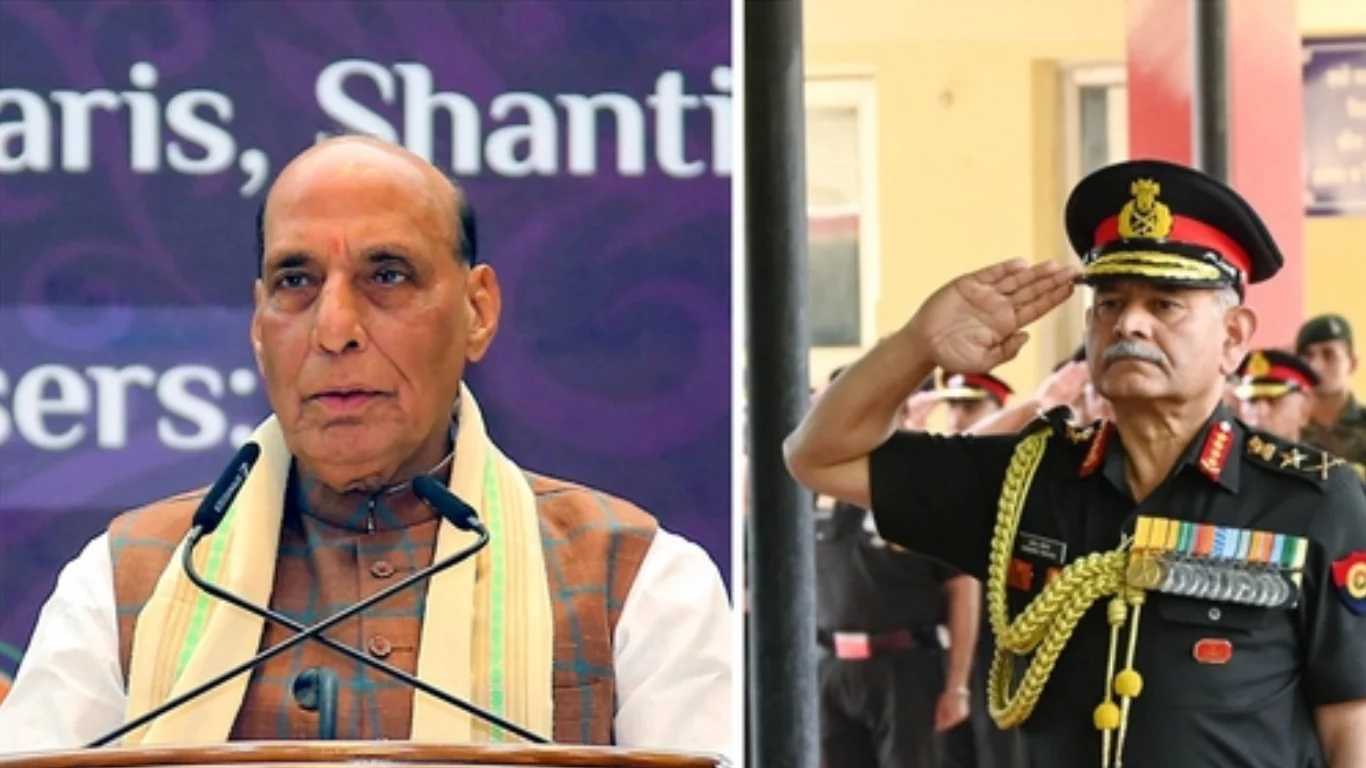
Defence Minister Rajnath Singh on Wednesday chaired a pivotal high-level security meeting in the aftermath of the devastating terrorist strike in Pahalgam, Jammu and Kashmir, which left 26 people dead, the majority of them tourists visiting the picturesque region. The brutal attack, which took place at the Baisaran meadow—popularly known as ‘Mini Switzerland’—sent shockwaves across the country and prompted swift action from India’s top security and defence leadership. The meeting saw the participation of National Security Advisor Ajit Doval, Air Force Chief Air Chief Marshal AP Singh, Army Chief General Upendra Dwivedi, and Navy Chief Admiral Dinesh Tripathi, reflecting the urgency and gravity of the situation.
This gathering of India’s top brass served not only as a damage assessment exercise but also as a strategic forum to recalibrate the nation’s security posture in Jammu and Kashmir. According to sources cited by ANI, the agenda was comprehensive, spanning immediate tactical responses, strengthening of ground intelligence, and the rapid deployment of additional troops to prevent further escalation. The central focus of the meeting was to evaluate the current situation on the ground and plan both immediate and sustained counter-terror measures.
General Dwivedi and Admiral Tripathi provided the Defence Minister with detailed updates on troop deployments, intelligence flow, and coordination between the armed forces and paramilitary units in the Valley. Following the attack, the Indian Army and CRPF intensified operations in the area, launching extensive search missions in nearby forests and mountainous zones, where it is believed the attackers may have fled. These areas have been marked as priority zones for “search and destroy” operations, with additional reinforcements deployed for containment and elimination of the threat.
Further strategic discussions are anticipated at the Cabinet Committee on Security (CCS) meeting later today, which will be chaired by Prime Minister Narendra Modi. The CCS is expected to deliberate on broader national security implications and long-term policy adjustments required to deal with persistent cross-border terrorism. The CCS may also explore enhancing international intelligence-sharing protocols and technological surveillance capabilities to plug infiltration routes and preempt such attacks.
In the immediate aftermath of the attack, Defence Minister Rajnath Singh expressed his deep sorrow and condemnation in a heartfelt message on X. “Deeply anguished by the news of the terrorist attack in Pahalgam (Jammu & Kashmir). This dastardly attack on innocent civilians is an act of cowardice and highly reprehensible. My thoughts and prayers are with the innocent victims and their families,” he posted. He reaffirmed the government’s zero-tolerance policy on terrorism and stressed the need for seamless coordination among intelligence and defence units to prevent future tragedies.
To aid ongoing operations, intelligence agencies and the CRPF have mobilized specialized units to enhance surveillance in the affected region. Drone technology, aerial reconnaissance, and human intelligence assets are being extensively used to track down the militants believed to have infiltrated from the Kishtwar region. Intelligence inputs suggest that the terrorists took a covert route via Kokernag to reach the tourist-heavy destination of Pahalgam, an area typically perceived as secure for civilians and visitors.
The Resistance Front (TRF), a proxy outfit for the Pakistan-based Lashkar-e-Taiba (LeT), claimed responsibility for the attack, a revelation that has heightened diplomatic tensions. Indian intelligence agencies believe the timing and planning of the attack could have been influenced by recent provocative rhetoric from elements within the Pakistani military establishment. Although Pakistan’s Foreign Office issued a statement expressing “concern at the loss of tourist lives,” Indian officials view the message as lacking sincerity, especially given the history of cross-border militant support.
On the diplomatic front, Prime Minister Narendra Modi acted swiftly, cutting short his scheduled visit to Saudi Arabia to return to New Delhi. Home Minister Amit Shah also responded promptly by flying to Kashmir to oversee the situation on the ground, meet with local authorities, and offer condolences to the families affected by the tragedy. Their actions underscore the seriousness with which the Indian leadership is addressing both the security and emotional dimensions of the attack.
The global community has rallied in support of India, with world leaders expressing condolences and solidarity. U.S. President Donald Trump publicly condemned the attack and pledged America’s support in the fight against terrorism. Similarly, Chinese Ambassador to India Xu Feihong took to social media to denounce the violence, expressing “shock” at the incident and offering sympathies to the victims’ families. These international responses signal a unified stance against acts of terrorism and reinforce the importance of global cooperation in counterterrorism efforts.
As India braces for further strategic decisions from the CCS and operations intensify across Kashmir, the Pahalgam attack stands as a somber reminder of the ever-present threat of terrorism in the region. It also brings into sharp focus the need for constant vigilance, updated security protocols, and seamless coordination between the military, intelligence agencies, and diplomatic channels. The Indian government remains resolute in its commitment to justice, determined to apprehend those responsible and ensure that such brutal acts do not shake the nation’s resolve or security ever again.



















